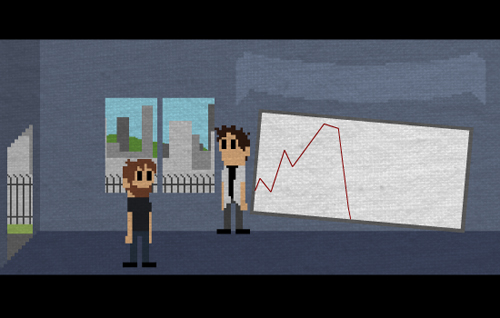独立游戏《One Chance》新颖的设计思路和题材引人关注
假如存活时间只剩下六天,你会做什么事呢?上述假设出现在独立flash游戏《One Chance》中,这款静谧的传统冒险游戏讲述了一个科学失误引发的悲惨故事。原本认为可以治愈癌症的方法培养出威胁地球所有生物的超级病毒,人类将在不到一周的时间里灭绝。
游戏的设计很妙,玩家没有第二次机会,也没有存盘点供你读取记录。正如游戏名所说的那样,你只有一次机会。你的电脑上会存储cookie,确保玩家只能打通《One Chance》一次。当然有方法解决上述问题,但这么做就违背了游戏的初衷。《One Chance》制作者Dean Moynihan说道:“游戏中的选择通常略显主观化,做出的选择绝对无法通过读取存档马上更改。如此设计的目的在于让玩家更深入地思考选择及其后果。”
选择让游戏体验变得丰富多彩。玩家扮演曾经因发明奇妙医学疗法而受人尊敬的天才John,这位主人公随后迅速成为最终抹杀全人类的罪人。游戏全程只需要10到20分钟的时间,但在此期间你需要面对无可避免的结局做出艰难的抉择。你是选择继续留在实验室中工作,研究抵抗病毒的疗法?还是与你分开已久的女儿度过这段时间?抑或是对妻子不忠?
Moynihan说道:“将游戏设计成单次通关的想法确实从开始就有,围绕这个主题编写故事是比较困难的环节。我想让游戏中的选择不那么黑白分明,这意味着设计的选择将经常涉及到对‘高尚做法’的处理。比如John会与家人共同度过最后这些时日,还是尝试拯救世界?”
故事有某些不好的结局,如果玩家选择在最后这几天出轨,那么故事结局可能特别具有讽刺意味。Moynihan表示他挺喜欢最糟糕的结局,即John同时失去了家庭和世界。他说道:“这个结局就是玩家之前所做选择的缩影。”
粉丝们期待看到这个游戏有良好的结局。Moynihan声称自己收到很多信件询问如何才能找到疗法,但他认为这可能不是完美的结局。游戏邦觉得,制作者说的某些结局可能还更好。Moynihan说道:“我最喜欢的结局是John在最后一天又被传送回第一天,重新安排那一周的生活,做出不同的选择。”
图像简单既是制作者自己的选择,大概也是他必然的做法。他说道:“我模仿自己喜爱的SNES和Mega Drive时代的游戏,这种对过去事物的依恋确实影响到游戏制作。当然,我对美工完全不在行,这也是原因之一。”
本作并非Moynihan首次探索类似主题和风格的成果,他表示自己之前制作的《Tree of Knowledge》也是关于选择的游戏。此作更为简单,玩家选择食用圣经知识树的善与恶。游戏不反对多人体验,事实上发现事物的两面性正是理解游戏信息的最佳方法。
Moynihan说道:“我想正是出于制作游戏这种简单的选择,才使我有精力思考游戏中的抉择。”现在,他的成功已转化为成熟的互联网文化。其他游戏总评论只有5000个左右,而《One Chance》的评论数已经超过200万。Moynihan说道:“游戏的发展有点势不可挡。”(本文为游戏邦/gamerboom.com编译,转载请注明来源:游戏邦)
What Would You Do if You Had Six Days to Live?
What would you do if you had six days to live? That’s the intriguing premise behind the indie flash game One Chance. The quiet, classic adventure presentation tells a melancholy story of science gone wrong. What was thought to be a cure for cancer becomes a super-virus that threatens all life on Earth, and it will destroy humanity in less than a week.
This game has a wrinkle, though. There are no second chances, no reloading from checkpoints. As the name implies, you have one chance. A cookie stored on your computer assures that your first play through of One Chance is your only one. There are ways around it, of course, but taking that route undermines the game’s poignancy. “Choices within games often feel a little arbitrary,” says One Chance creator Dean Moynihan. “There’s absolutely no weight in a choice that you can immediately change upon loading an old save. The plan was to get players to think about a choice and its consequences a little deeper than in any other game.”
Those choices color the game experience. You take the role of John, once hailed as a genius for creating a miracle cure, then quickly vilified as the man who will ultimately wipe out humanity. The game only takes 10-20 minutes, but in that time you make hard choices about how one faces the inevitable. Do you keep working in your lab for a cure? Spend the time you have left with your daughter? Cheat on your wife?
“The single playthrough idea definitely came first; it was writing the story around that which was the harder part,” says Moynihan. “I wanted the choices in the game to not be so black and white. This meant creating choices that would often involve dealing with ‘the greater good.’ Would John spend the last few days on earth with his family or spend it trying to save the world?”
The story can lead to some dark places. One possible story beat is particularly ironic if you choose to have an affair — Moynihan says his favorite ending is also the worst, in which John loses both his family and the world. “It completely epitomizes the choices the player has made to get to that point.”
Being a video game, fans were eager to find the “good” ending. Moynihan says he received a lot of messages asking how to find the cure, but that possibility isn’t a perfect ending. Some happier possibilities were even cut. “My favorite deleted scene was a Back to the Future Easter egg, in which John, on the last day, could travel back in time to the first day and relive the week again, making different choices.”
The simplistic graphics were both a conscious choice and a matter of necessity. “I look back lovingly at the SNES and Mega Drive era of gaming,” he says. “It was definitely nostalgia that influenced the game. Also, I can’t draw. At all.”
This isn’t the first time Moynihan has explored similar themes and tone. He says one of his previous games, Tree of Knowledge, “was fundamentally a game about choices.” It was much more simplistic, letting the player eat from the Biblical knowledge tree of good and evil. It didn’t discourage multiple playthroughs; in fact, the best way to understand the game’s message is to see both possibilities.
“I think it was from making that game, with such a simple choice, that made me keep thinking about decisions in games.” Now his modest success has turned into a full-fledged internet meme. His other games have barely cracked 5,000 views combined; One Chance, by comparison, has hit over two million. “It’s a little overwhelming,” says Moynihan. (Source: 1up)









































 闽公网安备35020302001549号
闽公网安备35020302001549号